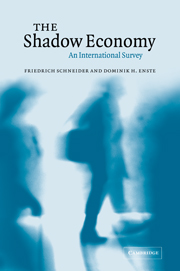Book contents
- Frontmatter
- Contents
- List of figures
- List of tables
- Foreword by Vito Tanzi
- 1 The shadow economy: a challenge for economic and social policy
- 2 Defining the shadow economy
- 3 Methods to estimate the size of the shadow economy
- 4 Size of shadow economies around the world
- 5 The size of the shadow economy labour force
- 6 An integrated approach to explain deviant behaviour
- 7 Analysing the causes and measures of economic policy
- 8 Effects of the increasing shadow economy
- 9 The ‘two-pillar strategy’
- 10 Conclusion and outlook
- List of references
- Index
Foreword by Vito Tanzi
Published online by Cambridge University Press: 13 July 2009
- Frontmatter
- Contents
- List of figures
- List of tables
- Foreword by Vito Tanzi
- 1 The shadow economy: a challenge for economic and social policy
- 2 Defining the shadow economy
- 3 Methods to estimate the size of the shadow economy
- 4 Size of shadow economies around the world
- 5 The size of the shadow economy labour force
- 6 An integrated approach to explain deviant behaviour
- 7 Analysing the causes and measures of economic policy
- 8 Effects of the increasing shadow economy
- 9 The ‘two-pillar strategy’
- 10 Conclusion and outlook
- List of references
- Index
Summary
More than two decades ago, economists discovered what they considered a rather strange phenomenon to which they gave many names including that of ‘underground economy’. This discovery was followed by attempts aimed at defining it; measuring its size; assessing its implications for economic policy and its effects on the economy; and suggesting policies that would reduce or eliminate it. As one would have expected, there was inevitable controversy accompanying this work. Surprisingly, though, this early great interest was soon followed by a period of neglect. It seems that the economic profession, immersed as it was in its theories, could not cope or was unwilling to cope with the messy world of the underground economy.
In more recent years, and for a variety of reasons, including the obvious one that the growth and large size of the underground economy made it progressively more difficult for economists and statistical offices to keep ignoring it, interest in this phenomenon has revived with a vengeance.
Friedrich Schneider was one of the few daring souls who entered this area early and who has kept a continuing interest in it. I was fortunate a few years ago, when I was director of the fiscal affairs department of the IMF, to have invited him to take up a visiting professorship to the Fund to continue his work on the underground economy. He produced a substantive paper that has grown into a book that represents a major contribution to this area.
- Type
- Chapter
- Information
- The Shadow EconomyAn International Survey, pp. xiii - xivPublisher: Cambridge University PressPrint publication year: 2003
- 1
- Cited by



